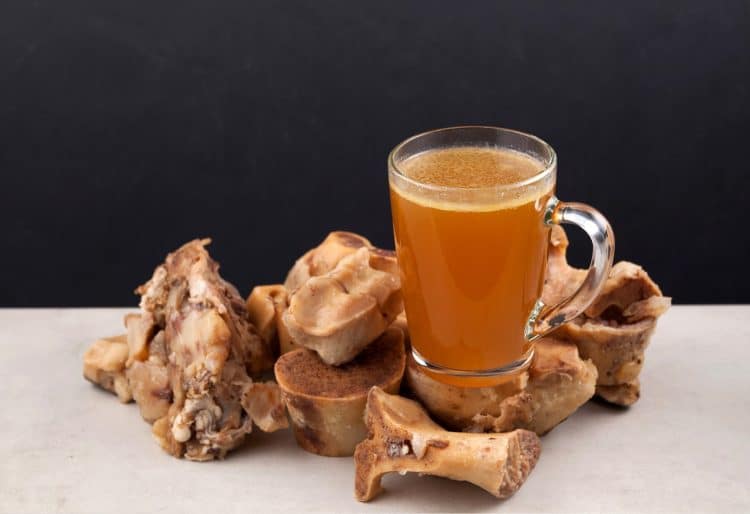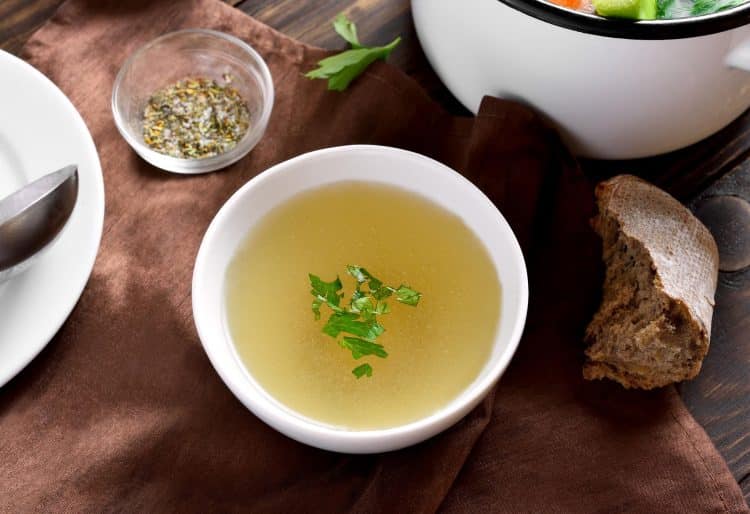Beginners might find it challenging to stick to the fasting windows during their initial intermittent fasting (IF) days. You might also come across conflicting information about a nutrient-dense food called bone broth and whether it interferes with intermittent fasting. This article has all the information you need to know about bone broth and its role in intermittent fasting.
Intermittent Fasting: What is Allowed?
To understand why and how bone broth could break an ongoing fast, you need to learn about the basics of intermittent fasting. Intermittent fasting is not a dry fast. You can drink water, black tea, and coffee during the fasting window of an IF fast.

Check out the monk fast and its benefits or the water-only fast to understand more about various types of intermittent fasting.
What is Bone Broth? How To Make It?
You get bone broth by boiling down animal bones and connective tissue. The amount of nutrition derived from a standard serving differs depending on the ingredients, but here are some nutrition facts for one cup (249 g) of chicken broth [1]:
- Fat: 0.523 g
- Energy: 14.9 Kcal
- Sodium: 924 mg
- Carbohydrates: 1.1 g
- Protein: 1.59 g
- Iron: 0.174 g

Will Bone Broth Break My Fast?
Yes, bone broth can break your fast. A simple answer to this question would be yes. Technically, your fast breaks the minute you consume calories.
However, while intermittent fasting, a few calories in the form of black tea or sugar coffee during the fasting window are acceptable. But remember: You need to limit your calorie intake to less than five calories per serving during the fasting period.
Level Up Your Fitness: Join our 💪 strong community in Fitness Volt Newsletter. Get daily inspiration, expert-backed workouts, nutrition tips, the latest in strength sports, and the support you need to reach your goals. Subscribe for free!
Bone broth usually contains 31 calories per serving.
However, the difference in opinions arises from how bone broth interacts with fasting.
Technically, your fast will end as soon as you consume bone broth. However, the main aim of intermittent fasting is to get the body into a keto state (fat-burning stage). If you are doing a prolonged fast, bone broth can help with ketosis, which is why many people think it is okay to have a cup of it during a fast.
Even if you were to use bone broth to break your fast, you would still receive the many benefits of fasting.
What are the Benefits of Consuming Bone Broth During Intermittent Fasting?
Some people question the presence of metals in bone broth and whether it harms the body. Studies show the calcium and magnesium levels in bone broth are low and do not pose any health risks. [2] Bone broth, in fact, has the following benefits:
1. Contains Low Calories
Bone broth contains limited calories (30 calories in a cup). It is also a clear liquid, which can help you ease out of the fasting state. Notably, you might be tempted to overeat after fasting for an extended period. As your body learns the fasting routine, you will see that it is best to ease out of a fast by consuming something light. Check here for a list of foods you should have during the eating window while practicing intermittent fasting.
2. Packed with Nutrients
Bone broth is packed with nutrients. An average cup of broth will contain around 5g of protein, magnesium, calcium, and iron. Bone broth is an excellent source of collagen and is recommended for bone, joint, and muscle health. Bone broth, in addition, will increase your protein intake and lead to better nutrition balance. [3]

3. Keto-Friendly
Bone broth contains little to no carbs. Bone broth is on your side if you intend to use intermittent fasting to maintain ketosis.
4. Promotes Sleep
Some IF practitioners believe bone broth helps you get to sleep easily. It might be because bone broth contains glycine, an amino acid that can help you sleep. It is important because fasting puts unavoidable stress on the body, making it difficult for some to fall asleep. Drinking a cup of bone broth before retiring for the night might help if you have trouble falling asleep while fasting. [4]
5. Maintains Healthy Insulin Levels
Consuming bone broth might help reduce your sugar levels. Bone broth contains all nine essential amino acids, of which glycine is the most important. Scientific studies have shown glycine is responsible for supporting healthy insulin levels. When you practice intermittent fasting aided by drinking bone broth, your body weight will decrease along with a reduction in the levels of insulin resistance. [5]
6. Strengthens the Immune System
Intermittent fasting and the consumption of bone broth can have anti-inflammatory benefits. It boosts your immune system and cellular and gut lining health. Research also says that the phenomenon of autophagy (where the body cleans out damaged cells) is more pronounced while fasting, leading to a healthier you. [6]
Related: Bone Marrow for bodybuilding.
Level Up Your Fitness: Join our 💪 strong community in Fitness Volt Newsletter. Get daily inspiration, expert-backed workouts, nutrition tips, the latest in strength sports, and the support you need to reach your goals. Subscribe for free!
What is Bone Broth Fasting?
Bone broth fasting is a method where you get the nutritional benefits of bone broth and the health benefits of intermittent fasting. It is also known as the bone broth diet, where you fast for longer but can have bone broth and collagen during your fasting window. You get all the benefits of a fast and consume fewer calories.
If you are new to intermittent fasting, going on a bone broth fast may be good for you. The key is to start small and work your way up to more extended periods of fasting. Here are some ways you can achieve it (in order of beginner to advanced):
- Skipping a meal: This is how rookies start, mostly. You begin by cutting a meal and replacing it with a cup of bone broth. Eat normally during the next meal.
- 16:8 method: Consume a cup of bone broth to get collagen within the 16 hours of fasting window. During your 8-hour feeding window, support your gut health with healthy doses of probiotics and fruit.
- 24-hour fast with bone broth: Here, you are supposed to consume only bone broth with collagens during the day, nothing else. This fast is not to be practiced more than once a week.
- Fasting two times a week: You fast for two days a week in this method. This advanced method is not recommended for beginners. Here you can have gelatin, vegetables, collagen, and different kinds of bone broth during your fasting period.
Following Bone Broth Intermittent Fasting
Seasoned fasters generally go for 72 hours of fasting, during which they only have bone broth. You can follow the 16:8 method, where you consume bone broth during the fasting window and regular meals during the feeding window. The 5:2 intermittent fasting method also applies, where you have bone broth instead of your regular meals for two days a week and regular meals for the remaining days.
How To Break Bone Broth Fast?
When breaking a bone broth fast, you should proceed with caution, as consuming a big chunk of carbohydrates at once can spike your blood glucose levels. You should ideally break your fast with salads and eggs. You should gradually increase the carb content and your meal size.
When To Use Bone Broth in a Fasting Window?
If you like to work out while fasting, it is a great idea to have some bone broth before you hit the gym. Bone broth is a great pre-workout meal as it strengthens your bones and tissues. [7]
Also, if you are following an extended fast and are facing problems like hunger pangs, fatigue, or cravings, it is good to include bone broth in your diet.
Consume a cup of bone broth daily if you are concerned about not packing enough nutrients in your diet.
One Important Tip For Bone Broth Fasting
You should consume sufficient electrolytes and water while fasting with bone broth. Low electrolyte levels can cause fatigue, muscle cramps, headaches, confusion, thirst, an irregular heartbeat, and muscle weakness.
Refrain from buying a bone broth product loaded with salt and other preservatives. Stop fasting and contact your doctor if you experience any of the above symptoms. Resume only under expert supervision.
Obesity: A Man-Made Calamity
One of the biggest causes of disease and discomfort these days is the overarching problem of obesity. It chooses its victims indiscriminately, with all facets of society ill-affected by its vagaries. There is still much to be done regarding research and studies into obesity.
Fasting is one of the most efficient ways of shedding extra pounds. Of late, there have been several kinds of fasting doing the rounds, with each method having its fair share of enthusiastic followers. You can practice intermittent fasting and take bone broth to reap the additional benefits it promises. The important thing is to choose a routine you can sustain.
FAQs
How much bone broth can break a fast?
Eating or drinking anything with calories, such as bone broth, during fasting will break your fast if you are aiming for autophagy. A cup of bone broth contains 40-50 calories; technically, that is enough to break a fast.
Does bone broth count as food while doing intermittent fasting?
Any kind of food or drink that contains calories (just like bone broth and healthy fats) will break your fast when looked at from a technical standpoint.
What happens when you break a fast with bone broth?
After the fasting period, if you consume organic bone broth, it will help your body absorb more nutrients in a far more efficient manner. Apart from this, bone broth also helps in the digestion of other foods that you consume. Additionally, bone broth contains collagen, which is vital for muscles, bones, skin, and hair.
Can I lose weight on the bone broth fast?
The two days of bone broth fasting per week will help you reduce your weight efficiently as it will limit your calorie intake. Additionally, you will feel full after consuming bone broth, and it will prevent you from having sugary or processed foods, which is good when you are on a diet.
Learn more about fasting
- How Long Until Intermittent Fasting Works? A Realistic Timeline for Results
- When Does Your Body Start Burning Fat with Intermittent Fasting?
- 14/10 Intermittent Fasting: The Simple Hack for Better Health and Weight Loss
- The Ultimate Guide to Alternate-Day Fasting: Boost Metabolism, Lose Weight, & Feel Great
- Intermittent Fasting and Exercise: Should You Work Out on an Empty Stomach?
- 6 Surprising Facts About Meal Timing and Metabolism
- Forget Eating Before Workouts — Do Fasted Training for Increased Fat Oxidation
- Is Intermittent Fasting Safe for You? Here’s What the Experts Say
Wrapping Up
Any food or drink with calories is technically not permitted during a fast, including bone broth. However, there is enough evidence to prove bone broth helps you get through intermittent fasting with minimal calories.
As far as things stand now, the medical community is divided on whether bone broth spikes insulin levels. Hence, until we know more, it would be better for you to stick to a cup of bone broth when needed. Also, drink lemon water and unsweetened tea and coffee during the fasting window of your intermittent fast, and stick to wholesome foods for your eating window.
References
- “FoodData Central.” FoodData Central, fdc.nal.usda.gov/fdc-app.html#/food-details/174536/nutrients. Accessed 14 Nov. 2022.
- Hsu, Der-jen, et al. “Essential and Toxic Metals in Animal Bone Broths.” PubMed Central (PMC), 18 July 2017
- Ginty, Fiona. “Dietary Protein and Bone Health | Proceedings of the Nutrition Society | Cambridge Core.” Cambridge Core, 7 Mar. 2007
- YAMADERA, Wataru, et al. “Glycine Ingestion Improves Subjective Sleep Quality in Human Volunteers, Correlating With Polysomnographic Changes.” Sleep and Biological Rhythms, vol. 5, no. 2, Springer Science and Business Media LLC, Mar. 2007, pp. 126–31. Crossref
- “Effect of Glycine on Insulin Secretion and Action in Healthy First-degree Relatives of Type 2 Diabetes Mellitus Patients – PubMed.” PubMed, 1 June 2001
- Mar-Solís, Laura M., et al. “Analysis of the Anti-Inflammatory Capacity of Bone Broth in a Murine Model of Ulcerative Colitis.” PubMed Central (PMC), 20 Oct. 2021
- McEvoy, Claire T., et al. “Vegetarian Diets, Low-meat Diets, and Health: A Review | Public Health Nutrition | Cambridge Core.” Cambridge Core, 3 Apr. 2012,












